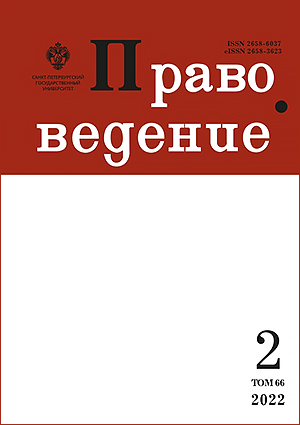Some aspects of a comparative legal analysis of the doctrine of error at the conclusion of a contract
DOI:
https://doi.org/10.21638/spbu25.2022.202Abstract
The article presents the result of a comparative legal analysis of the aspects of the doctrine of error at the contract conclusion. The general origin of the concept of error roots in Roman law and was further developed along with the concept of contract and its validity. It is interesting how a variety of legal theories of error developed from one common Roman beginning, each of which is in constant search for difficult compromises. The author considers in a comparative legal context the issue of the admissibility of error in the circumstances of the future. Existing exceptions to the generally accepted refusal to recognize the significance of error about future facts are reviewed. The article also analyzes the nature of the problem of assessing the significance of error. Firstly, the nature of the problem of assessing error can be related to the fundamental contradictions of the principles of contract law, which must be taken into account when considering the significance of error. The doctrine of mistake is at the intersection of basic civil law principles, namely, binding of the contractual obligations (pacta sunt servanda), on the one hand, and the principles of freedom and autonomy of will, on the other. In this regard, the doctrine is one of the most controversial doctrines of contract law and seeks a balance between the interests of the stability of the turnover and the interests of each individual participant. Secondly, the nature of the problem of assessment of error is related to the issue of the correlation between contractual theory and defects of will. Depending on the prevailing contract theory, liberal or interventional, the key tasks of law are determined, respectively: either ensuring formal equality of opportunities between the parties and guaranteeing procedural contractual fairness, or ensuring substantive contractual fairness. Depending on this, a balance is determined in the search for the significance of error. The author of the article also proposes to get acquainted with the results of a comparative legal study of the criteria for the significance of an error used in some countries of the European civil tradition and common law countries. Subjective and objective concepts of significance are analyzed, as well as combinations of their elements, which are reflected in the regulation of the considered legal orders. The study is useful for developing and improving the domestic doctrine of error.
Keywords:
contract, contractual obligations, error, mistake, significant error, essential error, fundamental error
Downloads
References
Benson, Peter (ed.). 2001. The Theory of Contract Law: New Easay. 1st ed. Cambridge, Cambridge Studies in Philosophy and Law.
Cartwright, John. 2012. Misrepresentation, Mistake and Non-Disclosure. 3rd ed. UK, Sweet & Maxwell, Thomsan Reuters.
Cartwright, John, Fauverque-Cosson, Benedicte, Whittaker, Simon. 2016. The Law of Contract, the general regime of obligations, and proof of obligations. The new provisions of the Code civil created by Ordonnance no 2016-131 of 10 February 2016 translated into English. Available at: http://www.textes.justice.gouv.fr/art_pix/THE-LAW-OF-CONTRACT-2-5-16.pdf (accessed: 07.02.2022).
Delvin, Alan, Raskov, Danila E. 2019. Basic principles of law and economics. Moscow, Delo RANKhiGS Publ. (In Russian)
Ferreira, Durval. 1995. Erro Negocial. Objecto — Motives — Base Negocial e Alteração de Circunstâncias. Coimbra.
Gautschi, Georg (ed.). 1995. Berner Kommentar zum Schweizerischen Zivilgesetzbuch. Vol. VI: das Obligationrecht 1.
Ghestin, Jacques. 1993. Traité de droit civil. La formation du contrat. 3rd ed. Paris, Librairie générale de droit et de jurisprudence.
Gordley, James. 2009. Mistake in contract formation. Rus. ed. Vestnik grazhdanskogo prava 4: 235–276. (In Russian)
Kramer, Ernst A., Probst, Thomas. 2018. II. Mistake, in: International Encyclopedia of Comparative Law Online, ed. by U. Drobnig, R. David, H. H. Egawa, R. Graveson, V. Knapp, A. T. Von Mehren, Y. Noda, et al. http://dx.doi.org/10.1163/2589-4021_IECO_COM_0
Kull, Andrew. 1991. Mistake, Frustration, and the Windfall Principle of Contract Rem edies. Hastings L. J.: 1–55.
Larenz, Wolf. 1988. Allgemeiner Teil des deutschen Bürgerlichen Rechts. 7th ed. Münich.
Odintsova, Marina. I. 2007. The Economics of Law. Moscow, GU-VShE. (In Russian)
Perillo, Joseph M. 1996. Hardship and its Impact on Contractual Obligations — A Comparative Analysis. Rome. Saggi, conferenze e seminari Centro di Studi e Ricerce di Diritto Comparato e Straniero no. 20.
Pires de Lima, Fernando A., Antunes Varela, Joᾶo de Matos. 1987. Código civil anotado I. 4th ed. Coimbra.
Pineau, Jean, Burman, Danielle. 2004. Théories des obligations. 4d ed. Montreal, Faculté de droit, Université de Montréal.
Poldnikov, Dmitrii Iu. 2008. Contractual theories of glossators. Moscow, Academia Publ. (In Russian)
Posner, Richard. 2004. Economic Analysis of Law. Vol. 1. St Petersburg, Ekonomicheskaia shkola Publ. (In Russian)
Säcker, Franz Jürgen (ed.). 2001. Münchener Kommentar zum Bürgerlichen Gezetzbuch. Vol. 1, Allgemeiner Teil §§ 1–240, AGB-Gezetz. 4th ed. München, Verlag C. H. Beck.
Savigny, Friedrich Carl von. 1840. System des heutigen Römischen Rechts. 3rd vol. Berlin, Veit und Comp.
Sefton-Green, Ruth (ed.). 2005. Mistake, Fraud and Duties to Inform in European Contract Law. Cambridge, New York, Melbourne, Madrid, Cape Town, Singapore, Sao Paulo, Cambridge University Press.
Treitel, Guenter H. 1999. The Law of Contract. 10th ed. London, Sweet & Maxwell.
Zimmermann, Reinhard. 1990. The law of obligations. Roman foundations of the civilian tradition. Cape Town, Juta & Co.
Zitelmann, Ernst. 1879. Irrtum und Rechtsgeschäft: Eine psychologisch-juristische Untersuchung. Leipzig, Duncker & Humblot.
Downloads
Published
How to Cite
Issue
Section
License
Articles of "Pravovedenie" are open access distributed under the terms of the License Agreement with Saint Petersburg State University, which permits to the authors unrestricted distribution and self-archiving free of charge.




